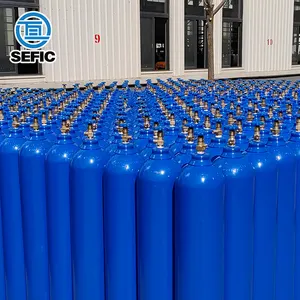
ISO9809-3 TPED 40L 150bar Medical Oxygen Gas Cylinder CO2/Nitrogen/Argon/Helium/Hydrogen/Xenon/Neon Gas Cylinders

R600a Refrigerant R32 Refrigerant R290 R32 R22 R134a Refrigerant Gas Charging Filling Machine Equipment Station For Ac




















R134a gas cylinders are essential components in refrigeration and air conditioning systems, known for their role in cooling mechanisms. These cylinders contain R134a, a hydrofluorocarbon refrigerant, which has been widely adopted due to its lower environmental impact compared to its predecessors. This introduction delves into the various aspects of R134a gas cylinders, ensuring that businesses understand their applications and features.
There are several types of R134a refrigerant cylinders available, designed to meet the diverse needs of commercial and industrial applications. These cylinders are commonly used in automotive air conditioning systems, commercial refrigeration units, and HVAC systems in residential and commercial buildings. The versatility of these cylinders makes them suitable for a range of cooling tasks, from vehicle climate control to large-scale food preservation.
The construction of an R134a cylinder is a testament to its durability and safety. Typically made from high-strength steel or aluminum, these cylinders are engineered to withstand high pressures and resist corrosion. The design includes safety features such as pressure relief valves and tamper-proof seals, ensuring the containment of the refrigerant under various conditions. The robust materials and construction safeguard the integrity of the gas, maintaining its purity and effectiveness.
Utilizing R134a gas in cylinders offers several advantages. It is known for its low toxicity and non-flammability, making it a safer choice for workers and the environment. Additionally, R134a has a relatively low global warming potential (GWP), aligning with environmental sustainability goals. Its thermodynamic properties allow for efficient cooling, which can lead to energy savings in systems designed for its use.
The shift towards R134a refrigerant reflects a global commitment to reducing the environmental impact of cooling systems. While it is a more eco-friendly option compared to older refrigerants, the industry continues to seek alternatives with even lower GWP to further minimize the carbon footprint of refrigeration and air conditioning systems. Nevertheless, R134a remains a widely accepted transitional solution in the path towards sustainability.
Selecting the appropriate R134a gas cylinder is crucial for any application. Factors to consider include the size of the cylinder, which should correspond to the scale of the cooling system, and the quality of the refrigerant, which affects the efficiency and longevity of the system. It is important to source cylinders from reputable suppliers who adhere to industry standards and regulations, ensuring the reliability and safety of the product.